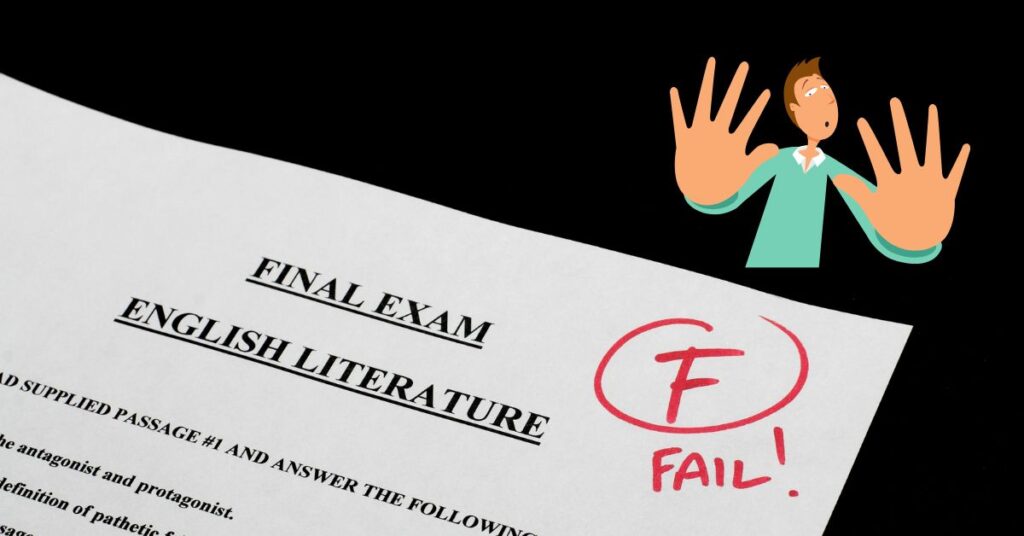Classes are a necessary part of our education, but sometimes things happen, and we have to withdraw from a course. It’s important to know the ins and outs of withdrawing so that you make the best decision for yourself-both academically and professionally.
Does withdrawing from a course look bad? What is the significance of a “W”? When should you withdraw from a class? This blog post will answer all of these questions (and more!)
Why a “W” Is Significant
When you’re in college, sometimes you just have to cut your losses and withdraw from a class. Whether it’s because the material is too challenging, the workload is too much, or you’re just not feeling it, there are a variety of reasons why students choose to withdraw from classes.
While it may seem like no big deal at the time, withdrawing from a class can significantly impact your college applications.

Admissions committees take into account the rigor of your course load when reviewing your application, and a withdrawal can suggest that you’re not up for the challenge of college-level academics. In addition, admissions committees also look at your grades when reviewing your application.
If you withdraw from a class and receive a “W” on your transcript, it could make you appear less competitive. So, while withdrawing from a class may seem like the best option at the time, it’s important to keep in mind the potential impact on your future.
When Should You Withdraw From a Class?
It’s a new semester, and you’re feeling good about the classes you signed up for. But then, a few weeks pass, and you’re struggling to keep up. You’re starting to wonder if you should just cut your losses and withdraw from the class. But before you make a decision, you should consider a few things.
- First, how is the class affecting your other courses? If you’re struggling in one class, it’s important to ensure that it isn’t dragging down your grades in other classes.
- Second, how close are you to the withdrawal deadline? It may be worth sticking out if it’s early in the semester. But if the deadline is approaching, it may be better to withdraw and focus on your other courses.
- Finally, how difficult would it be to retake the class? If it’s a course you need for your major, it may be worth trying again.
But withdrawing may not be a big deal if it’s a lower-level course that wouldn’t impact your degree progress. Ultimately, the decision of whether or not to withdraw from a class is a personal one.
But by taking the time to consider all of your options, you can make sure that you’re making the best decision for yourself and your academic career.
When Does Withdrawing From a Class Look Bad?
College is tough. There are a lot of classes, a lot of homework, and a lot of pressure to succeed. It’s normal to feel overwhelmed at times, and it’s also normal to want to give up. However, some situations may be where withdrawing from a class is not the best option.
Major Courses
For example, if you’re struggling in a class that is required for your major, withdrawing may set you back too far. Certain courses are required for transferring from a community college to a university, especially major courses that are prerequisites.
When you withdraw from a major preparation course, then you are essentially elongating the time it will take to transfer and graduate because the class you dropped is required for transferring.
Related: 6 Impacted Majors at UCLA you Should Know About | 2023
Multiple Withdrawals
There’s no doubt about it, withdrawing from a class is never a good look. Whether it’s because you’re struggling with the material or you’re just not feeling the class, dropping a course is something that should be avoided if at all possible.
But sometimes life happens, and you find yourself in a situation where you need to withdraw. If that’s the case, it’s important to know that withdrawing from multiple classes can start looking pretty bad on your transcript.
Not only does it make you look like you’re incapable of handling a full course load, but it can also make it appear that you’re not taking your education seriously.
Related: 5 Tips for a Strong College Application: Transfer Students
So if you find yourself in a situation where you need to withdraw from a class, try to limit it to just one. That way, you can avoid any potential damage to your academic record.
Pre or Post “W” Deadline?
Similarly, if you’re close to the end of the semester, withdrawing may not give you enough time to make up the work. If you are confident you will have a bad grade mark in the class, then it is important to consider withdrawing, but this is only true if you are before the Withdrawal deadline.
Generally, it’s best to speak with your professor or an academic advisor before deciding to withdraw from a class. They can help you weigh your options and decide what’s best for your situation.
Related: When do UC Decisions Come Out? Announcing 2023 UC Decision Dates
Course Withdrawals Frequently Asked Questions (FAQs)
Is it better to withdraw from a class or fail?
It’s a question that every college student has faced at some point: is it better to withdraw from a class or fail? There’s no easy answer, as both choices have pros and cons.Withdrawing from a class usually means that you won’t receive a grade for the semester, but it also means that the class will show up on your transcript. This can be beneficial if you’re struggling in the class and don’t want the grade to affect your GPA.
Related: The Importance of College Counselors in the Transfer ProcessHowever, it’s important to note that most colleges have limits on how many classes you can withdraw from before it starts to impact your academic standing.

On the other hand, failing a class will result in a permanent record of the grade on your transcript. This can damage your GPA, but it doesn’t necessarily mean you’ll be kicked out of college.
Ultimately, the decision of whether to withdraw or fail should be based on your individual circumstances. If you’re struggling in a class, speak with your professor or advisor to see if withdrawing is the best option for you.
Do colleges look at Withdrawn classes?
In general, colleges are more interested in seeing how you’ve handled challenging courses than they are in withdrawn classes. However, if you’ve withdrawn from a significant number of classes or if your grades in a particular area are low, that could be cause for concern.
It’s always best to check with the admissions office of the schools you’re interested in to find out their specific policy on withdrawn classes.
With that said, don’t let the fear of withdrawing from a class stop you from taking on a challenging course load. Chances are, colleges will be more impressed by your willingness to take on difficult courses than they will be by a perfect attendance record.
Does Dropping A Class Look Bad On Your Transcript?
It’s common for students to drop a class (or two) at some point during their college career. Whether it’s because the class is too difficult, the workload is excessive, or you’re just not interested in the subject matter, there are plenty of reasons why students decide to drop a class.
And while it may not be ideal, dropping a class is usually not a big deal. In most cases, dropped classes will simply appear as “W” (withdrawal) on your transcript. This means that the class will not count toward your GPA, but it also won’t have a negative impact on your academic record.
So, if you find yourself in a situation where dropping a class is your best option, don’t be too worried about it – just make sure that you do so before the deadline.
How much does a withdrawal affect your GPA?
Here’s what you need to know about withdrawing from a class and its effect on your GPA: generally, withdrawing from one or two classes won’t have too much of an impact on your grades.
However, if you withdraw from too many classes, or if they’re all high-level courses, you could be in trouble. Graduate schools and employers might take notice if your transcript is full of Ws.
But don’t worry too much – as long as you’re not withdrawing from every class and your GPA is still healthy, you should be okay.
 Source: @McGillArtsOASIS
Source: @McGillArtsOASIS
Can dropping or withdrawing from a class affect your financial aid?
If you’re receiving financial aid through grants or scholarships, then you generally don’t have to worry about losing your funding if you drop a class.
However, if you’re taking out loans to pay for school, then dropping a class could put you in danger of exceeding your maximum eligibility for financial aid.
Recommended Reading: What You Need to Know About Financial Aid for Community College Students
In addition, if you withdraw from all of your classes, you may not be able to receive any future financial aid until you’ve repaid the money that you’ve already borrowed.
So if you’re considering dropping a class, it’s important to weigh all the potential repercussions before making a decision.
Conclusion
Dropping or withdrawing from a class can have academic and financial consequences. It’s important to weigh all of the pros and cons before making a decision and to speak with your professor or advisor if you’re struggling in a course.
Withdrawing from a class is not always the best option, but there are times when it’s definitely the right choice.
If you’re considering withdrawing from a class, here are a few things to keep in mind:
- Withdrawing from one or two classes generally won’t have too much of an impact on your GPA.
- However, if you withdraw from too many classes, or if they’re all high-level courses, you could be in trouble.
- Dropping a class can affect your financial aid.
- It’s important to weigh all of the potential repercussions before making a decision.





